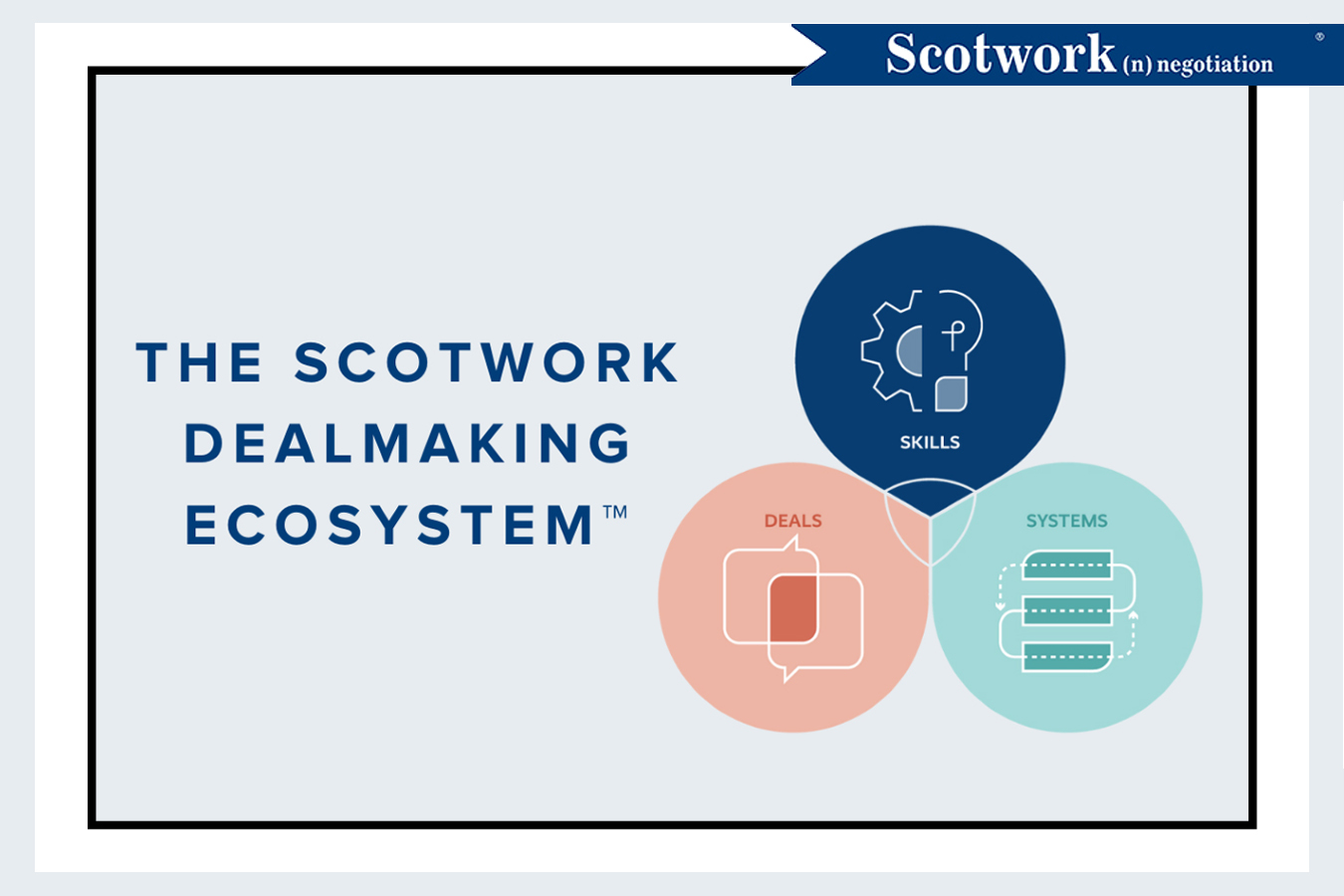When you’re in the middle of a deal and it starts to go sideways, it creates a palpable sense of despair and defeat. When you see your team put in every effort to negotiate good deals, but they’re getting crushed by the opposition, it’s disheartening and frustrating. These problems are stressful — and they repeat themselves when you have a suboptimal Dealmaking Ecosystem™.
Optimizing the Dealmaking Ecosystem requires an examination of the organizational processes and methods that support negotiators in their dealmaking. When this system breaks down, it can leave negotiators stranded and leadership flummoxed regarding what to do and how to support. The net results are suboptimal performance and more bad deals than good. When the system is optimized, negotiators are equipped to handle a variety of situations effectively, critical deals have the necessary resources and support, and leadership has the ability to drive consistency and efficiency across their dealmaking organizations. This leads to better deals faster while maintaining or strengthening relationships with the other party.
The Dealmaking Ecosystem consists of three pillars
- Skills
- Deals
- Systems
Skills
This pillar is focused on the individual negotiator or team of negotiators. Every negotiator, no matter how experienced or their level of seniority, already has a set of negotiation skills they’ve learned. The learning process began during childhood when we negotiated with our parents, siblings, or friends. It continued through adulthood and into our careers. However, most people are not purposefully developing this important life skill. Therefore, they learn bad habits or their skill set is narrow, and their success is limited to very specific situations.
Developing a negotiator is more than just an event — it’s a process. It requires assessing the current skill levels, creating a training program specific to a team but personalized for an individual, and then providing ongoing coaching and resources to support the negotiator’s development.
But just developing their skills isn’t enough. Negotiators are going to work on deals where they’ll need support to be successful. Support can come from peers, stakeholders, managers, and external consultants. In addition, internal processes will need to be optimized in order to ensure that the negotiator can provide management with visibility, gain access to resources, and operate in the most efficient manner.
Deals
This pillar is focused on specific negotiations — the deals. Most organizations tell their dealmakers to just go “do it,” without giving any support. For instance, I recently spoke with a client management leader, who told me that they regularly tell their account managers to increase the margins of the contracts, raise rates, and sell more of their solution set. He was very clear about what the negotiators needed to do. But when I asked him how they were to do that, he said that each negotiator had to figure it out for themselves. He admitted that the results have been inconsistent and only about 20% or less of his deals got close to the results he was expecting. Why was that? His team was left alone to figure it out.
Certainly, being skilled at negotiating will help with deals. But the reality is, no negotiator should go it alone. Every negotiation is an opportunity to create value, strengthen relationships, and set precedent for future engagements. Bringing in a team of negotiation experts helps the negotiator not only get the best deals possible but also protect the most critical deals an organization has.
Furthermore, well-defined systems and processes will help negotiators avoid wasting time determining how to navigate a deal internally or expending energy unnecessarily on aligning internal resources to support their negotiation.
Systems
Organizations are built around systems and processes. We have them for almost everything we do, from submitting expense reports to annual performance reviews to budget allocation. However, few organizations have a clearly defined negotiation process. Therefore, no matter how skilled a negotiator is or how much deal support they get, if the systems and processes do not support their dealmaking ventures, then lots of time, effort, and energy are wasted navigating the internal obstacles. Your internal systems should support dealmakers — not inhibit them.
More importantly, leadership should be in a position to have visibility into their deal pipeline, which will give them the ability to influence and guide the strategies of the deals their teams are working on. Ultimately, having a documented negotiation process that’s integrated into your organization’s core functions and key stakeholders’ processes will help you support your strategic objectives.
Certainly, talk to us when you need help with a deal or you see that your team needs to improve their skill set. We can do a lot to help in the short term. But to prevent systemic issues in the future, let us help you develop a strategy to optimize your entire Dealmaking Ecosystem™.
We Can Help You Optimize Your Dealmaking Ecosystem.
Are you in the middle of a deal that’s going sideways? Is your team working to negotiate good deals, only to get crushed by the opposition? These problems are stressful — and they repeat themselves when you have a suboptimal Dealmaking Ecosystem. We can help! Drawing on nearly 50 years of real-world negotiating experience, we’ll ensure that your negotiators are equipped to handle a variety of situations effectively, that their critical deals have the necessary resources and support, and that leadership has the ability to drive consistency and efficiency across their dealmaking organizations. Let’s partner you with one of our experts, so that you can start making better deals faster while maintaining or strengthening relationships with the other party.

